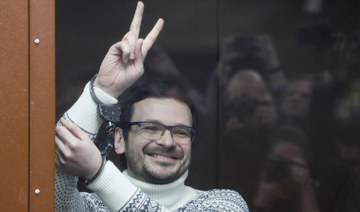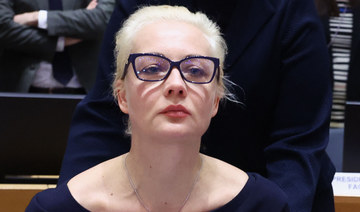TBILISI: Like many other young Russians, Anastasia Panchenko’s political awakening came courtesy of Alexei Navalny.
Left reeling by his sudden death, she is looking now to his widow Yulia to take on the mantle of Russian opposition leader.
Since Navalny died in an Arctic penal colony last Friday, Panchenko has been coming most days to lay flowers at an impromptu memorial to him in Tbilisi, the Georgian capital she has called home since fleeing Russia in 2021.
Once a journalist with a pro-Kremlin news outlet in Krasnodar, southern Russia, Panchenko quit her job and went to work in Navalny’s campaign office after police violently dispersed protests in 2017 that were prompted by one of his anti-corruption investigations.
“He turned my life on its head,” she said in an interview.
With Navalny gone, she is pinning her hopes on Yulia Navalnaya, who has pledged to continue her husband’s work and urged Russians to share her “rage” at President Vladimir Putin. The Kremlin denies involvement in Navalny’s death, which it says is under investigation.
“Yulia Navalnaya is our new hope,” Panchenko said. “She has taken upon herself all of Alexei Navalny’s political capital. I think she’s the lawful, legitimate leader of the opposition.”
Navalnaya, 47, has not yet had time to set out her vision for Russia’s opposition, whose leading members are in prison or abroad.
Currently outside Russia, she would risk arrest if she returned to the country — like Navalny himself, whose last day of freedom was the day he returned to Russia in January 2021 after recovering in a German hospital from an attempt to poison him in Siberia.
Semyon Kochkin, a former Navalny campaign manager now also living in Tbilisi, said the task ahead of his widow was daunting, especially from exile.
“Yulia always demonstratively said she didn’t want any part in politics. I never expected that she would go into this battle,” he said.
“I’m very worried for her because she’s in danger. They can do anything (to her). Of course she’s not in Russia, but even so. She was never a public figure. She is going to be gravely tested. We will support her.”
WHAT NOW?
Panchenko and Kochkin were both part of a national network of campaign offices set up by Navalny when he attempted to run for president in 2018 but was barred from standing.
After he was jailed in 2021, his network was banned as “extremist,” and most of his staffers fled Russia under threat of long prison sentences. Many moved to Georgia, which allows Russians to stay indefinitely, without a visa.
With Navalny now dead, Tbilisi’s tight-knit community of political exiles is grappling with the loss of a man many hoped would follow in the footsteps of South Africa’s Nelson Mandela, one day walking free from prison to become the country’s president.
Kochkin, 30, runs an anti-Kremlin channel on the Telegram messenger app, and maintains a list of natives of his home region of Chuvashia who have died in the war in Ukraine. He admits Navalny’s death has left him at a loss.
“I don’t really understand what we’re supposed to do in this situation right now,” said the activist, whom Russian authorities have designated a “foreign agent” and placed on a nationwide wanted list.
“We always thought of Alexei as the person who’d tell us what to do. He’d make the plan, and we’d carry it out. Now there’s no one who’s going to make that plan for us. We need to sit down and do it for ourselves.”
COLD CALLS
Dmitry Tsibiryov, the former head of Navalny’s headquarters in the Volga River city of Saratov, is another Georgia-based activist who says he will remain politically engaged.
As part of a project by Navalny’s Anti-Corruption Foundation (FBK), Tsibiryov has been cold-calling Russian voters for weeks, trying to persuade them to vote against Putin or spoil their ballots in a March 15-17 presidential election. He told Reuters he had spoken to about 70 by mid-February.
“Now, there’s no possibility of talking to residents of Russia face to face, but I can over the phone,” said Tsibiryov, 38.
“I believe in the beautiful Russia of the future,” he said, borrowing a slogan from Navalny. “What is the ocean, if not a lot of tiny droplets? We’re contributing those droplets in this project, one, two people at a time.”
Panchenko, the former journalist, says she is focused on fundraising and organizing legal support for those detained for commemorating Navalny’s death in her native Krasnodar region.
But while she looks now to Yulia Navalnaya, she is bereft at the death of her political idol.
“I think it’s an irreplaceable loss. Alexei Navalny’s name will be on people’s lips for a long time to come because it’s impossible to replace him,” she said.




























